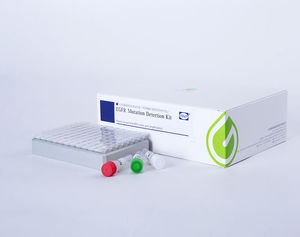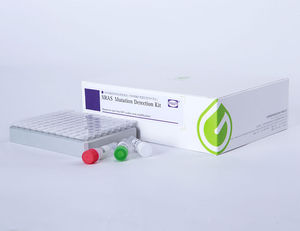
- Laboratory
- Laboratory medicine
- Colon cancer test kit
- Genetic Biotek

- Products
- Catalogs
- News & Trends
- Exhibitions
Lung cancer test kit colorectal canceroncologyfor KRAS mutations
Add to favorites
Compare this product
Characteristics
- Applications
- for lung cancer, colorectal cancer
- Application field
- oncology
- Tested parameter
- for KRAS mutations
- Sample type
- plasma, urine, tissue
- Analysis mode
- fluorescence
Description
[Intended use] About 30% of various cancer patients harbor KRAS somatic mutations, such as 30-40% in colorectal cancer, 2-10% in non-small cell lung cancer and 90% in pancreatic cancer. In addition, 90% of all the mutations concentrate on 12 and 13 codons in exon
2.
Importantly, cancer patents with KRAS mutations do not respond well to tyrosine kinase inhibitor therapy of Iressa, Tarceva, Erbitux and Vectibix, indicating the impact of the mutation status in therapy selection.
This kit detects seven common mutations in exon 2 of the KRAS gene with a total frequency >90% (Table 1).
The kits can be used for 1) early screening and early diagnosis of cancer, 2) early monitoring of cancer relapse, and 3) selection of targeted therapy.
[Detection principle] This kit uses pyrophosphorolysis activated polymerization (PAP ) technology to specifically amplify the mutant DNA but not wildtype DNA molecules. The amplified product is measured in real time fluorescence format.
[Samples] Fresh and frozen tissues, paraffin-embedded tissues, plasma and urine.
[Advantages]
1. High sensitivity: ability to detect a single copy of KRAS mutations.
2. High specificity: virtually no false positive amplifications even in the presence of heavy background of wildtype DNA.
3.Freeze-dried format: much earlier and user-friendly manipulation.
4. Non-invasive sampling: plasma and urine samples can be applied.
Related Searches
- Assay kit
- Blood assay kit
- Plasma assay kit
- Infectious disease detection kit
- Whole blood detection kit
- Optical assay kit
- Fluorescence assay kit
- Oncology test kit
- Urine assay kit
- Genetic test kit
- Tissue detection kit
- Oral fluid test kit
- Oncology test kit
- Nucleic acid assay kit
- DNA assay kit
- Abused drug test kit
- Genetic mutation detection kit
- Toxicology test kit
- Colorectal cancer test kit
- HIV assay kit
*Prices are pre-tax. They exclude delivery charges and customs duties and do not include additional charges for installation or activation options. Prices are indicative only and may vary by country, with changes to the cost of raw materials and exchange rates.




